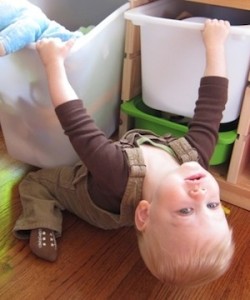 “The lotus is a symbol of the life of a householder yogi, one who maintains his or her calm and grace above the muddy ponds of life.”
“The lotus is a symbol of the life of a householder yogi, one who maintains his or her calm and grace above the muddy ponds of life.”
— Paramahansa Yogananda
By Lela Beem
“No,” I say, as my one-year-old Jasper reaches into the garbage can, hunting down a banana peel covered in coffee grounds.
“No,” I say again, with a little more firmness in my voice, “That’s YUCKY. Don’t touch that.”
A red-faced inhale precedes a heartbroken wail. This is how it is every time Mama curtails his enthusiastic dumpster dives. All the buried treasure…always forbidden.
Parenting a toddler emphasizes both the disgusting and the dangerous. I’ve put locks on all the knee-level cabinets. My husband has bolted nightstands and bookcases to the walls. Leaving the bedroom door open has proven disastrous on more than one occasion: a broken clock, a bruise on the forehead, a chokeable object discovered.
But in moments when I can relax into seeing the world through Jasper’s eyes, I am astonished by the vastness of our physical world. How full of wonder is the big open sky? How many types of structures can we construct with wooden blocks? As I observe his continued maturation, I am both awed and terrified to consider the ways in which his future might unfold.
Studying yoga has introduced me to the idea that there is a part of each person that has limitless potential for awareness and creativity. Moksha, or liberation, is the removal of the concept that Self is finite. An essential teaching of Tantra is to know that, even in a seemingly limited world, consciousness is without limitation. A young child, while unenlightened in the self-reflective sense, has a window into the pure bliss of just being present. That is, until a banana peel is taken away and a tantrum ensues.
Asana practice is an opportunity to respond to physical edges from an expansive mind-state, even when our habitual reaction is to throw a fit. Upon arriving at a tight hamstring that unequivocally says, “Stop!”, the potential to investigate yourself has just begun! The ability to witness your reactions to your limitations, both perceived and real, can be a window into moksha. The borders of flesh and bone are what enable us to explore the limitlessness of non-duality, rather than being what “holds us back.”
As a mother, it’s my job to introduce this brand-new human to the laws of gravity, the expectations of social order, and the contradictions of embodiment. Sometimes this feels unbearably sad, like I’m squelching his desire for discovery. But I wouldn’t be a loving parent if I didn’t show him how to carefully navigate the world. As he continues to test the boundaries of his universe, I hope that I can remember to not only say “No!”, but also an encouraging “Yes!” for inquiry, imagination and boundless enthusiasm.
Lela Beem, E-RYT 500, is co-founder of Grateful Yoga of Evanston and The Amala School of Prenatal Yoga. www.gratefulyoga.com

























No Responses to “The Householder Yogi: Freedom in Limitation”